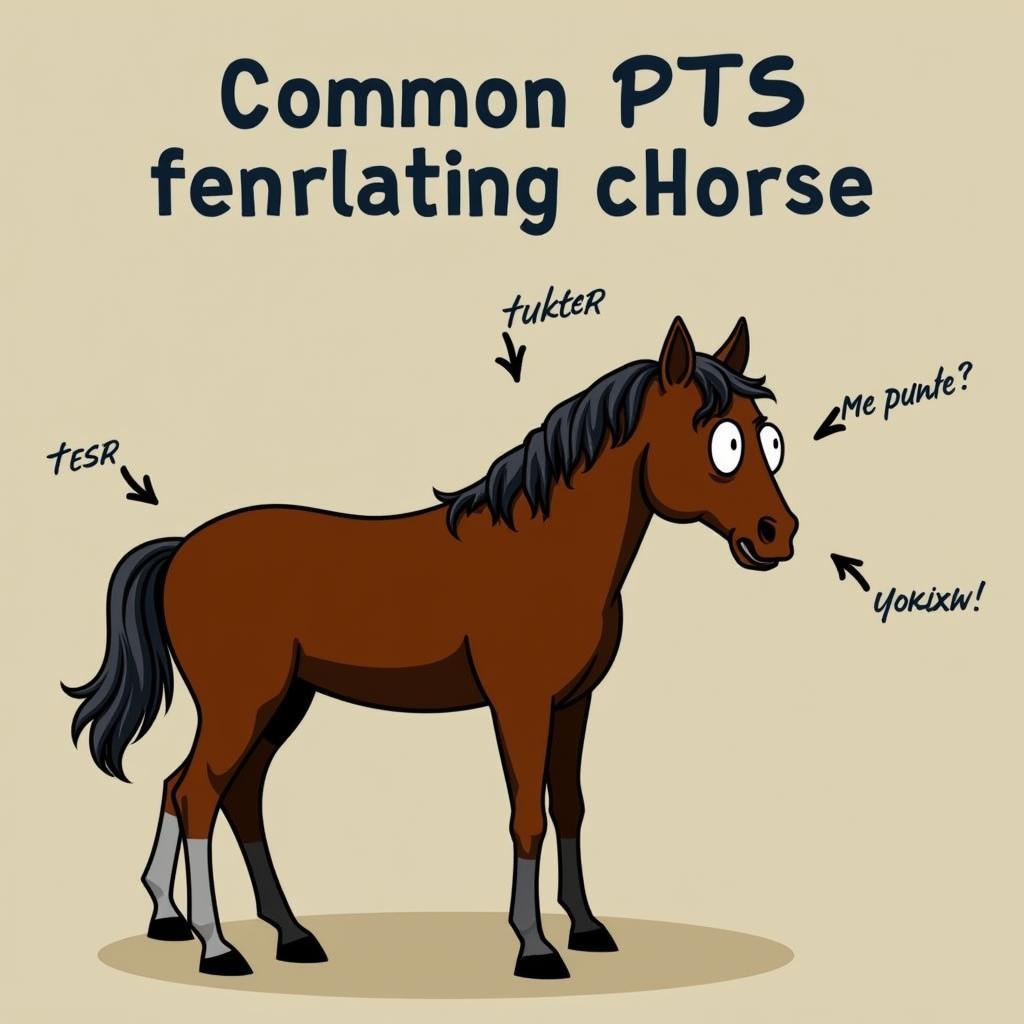Horse Pts, or Post-Traumatic Stress, is a serious condition that can affect horses of all breeds, ages, and backgrounds. Just like humans, horses can experience traumatic events that leave lasting emotional and behavioral scars. Recognizing the signs of PTS in your equine companion is crucial for their well-being and can pave the way for proper management and care.
 Horse showing signs of anxiety and fear
Horse showing signs of anxiety and fear
Recognizing the Silent Struggle: Symptoms of Horse PTS
Often, PTS in horses goes unnoticed as it manifests in subtle behavioral changes that can be mistaken for other issues. Here are some common indicators that your horse may be struggling with PTS:
- Hypervigilance: Horses with PTS are often on high alert, constantly scanning their surroundings for potential threats. They may startle easily at sudden noises or movements.
- Avoidance Behavior: Certain places, people, or objects may trigger fearful memories in a horse with PTS, leading them to avoid these triggers at all costs.
- Aggression: While not always the case, some horses may exhibit aggressive behavior as a defense mechanism when confronted with their triggers.
- Changes in Performance: A sudden drop in performance, especially in disciplines that require trust and partnership, can be a sign of underlying trauma.
- Physical Symptoms: PTS can manifest physically through symptoms like weight loss, digestive issues, and a compromised immune system.
Unveiling the Causes: What Triggers PTS in Horses?
Understanding the root cause of PTS is essential for effective treatment and management. Here are some common traumatic experiences that can lead to PTS in horses:
- Abuse or Neglect: Past experiences of physical abuse, neglect, or harsh training methods can have a lasting impact on a horse’s mental well-being.
- Difficult Handling: Improper handling techniques, especially during crucial developmental stages, can create negative associations and lead to trauma.
- Accidents or Injuries: A serious accident, injury, or a traumatic veterinary procedure can trigger PTS, as the horse associates pain and fear with the event.
- Natural Disasters: Experiencing a natural disaster like a fire, flood, or earthquake can be incredibly traumatic for horses.
Addressing Horse PTS: A Journey of Healing and Support
If you suspect your horse might be suffering from PTS, it’s vital to seek professional help. A qualified veterinarian specializing in equine behavior can assess your horse’s condition and recommend a tailored treatment plan.
- Building Trust: The foundation of addressing PTS is rebuilding trust and creating a safe and predictable environment for your horse. This involves using gentle handling techniques, positive reinforcement, and patience.
- Desensitization and Counter-Conditioning: This therapeutic approach involves gradually exposing the horse to their triggers in a controlled manner while associating these triggers with positive experiences.
- Medications: In some cases, veterinarians may prescribe medications to manage anxiety and help the horse cope with the symptoms of PTS.
- Alternative Therapies: Therapies like equine massage, aromatherapy, and acupuncture can complement traditional treatment methods by promoting relaxation and reducing stress.
Living with Horse PTS: A Long-Term Commitment
Managing PTS in horses is an ongoing commitment that requires understanding, patience, and dedication. Remember that every horse is unique, and the healing process will vary. By providing a loving and supportive environment, you can help your horse navigate the challenges of PTS and live a fulfilling life.
FAQs about Horse PTS
Can horses fully recover from PTS?
While complete recovery from PTS might be challenging, with proper care and treatment, many horses can significantly improve their quality of life and manage their symptoms effectively.
How long does it take to treat PTS in horses?
The duration of treatment varies depending on the severity of the trauma and the horse’s individual response to therapy. It’s a gradual process that requires patience and consistency.
What are the long-term effects of untreated PTS in horses?
Untreated PTS can lead to chronic anxiety, behavioral problems, and a diminished quality of life for the horse. It can also affect their relationship with humans and make handling and training difficult.
Can horses develop PTS from events that happened years ago?
Yes, traumatic memories can resurface even after years, especially if a trigger reminds the horse of the past event.
Is PTS more common in certain breeds of horses?
While PTS can affect any breed, horses that are naturally more sensitive or have been bred for specific temperaments might be more susceptible.
Need help with your horse? Contact Justus Horses USA at 0772127271, [email protected] or visit our center at QGM2+WX2, Vị Trung, Vị Thuỷ, Hậu Giang, Việt Nam. We are available 24/7 to assist you.